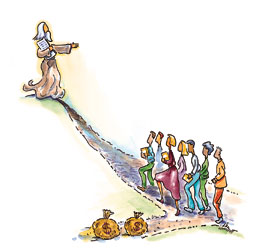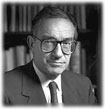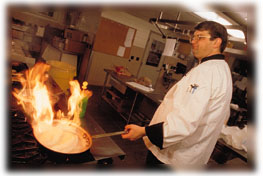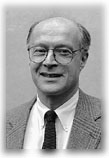![]()
Main Menu ·
Search ·
Current Issue · Contact · Archives · Centennial · Letters to the Editor · FAQs
![]()
Main Menu ·
Search ·
Current Issue · Contact · Archives · Centennial · Letters to the Editor · FAQs

MOSES TRUMPS MAMMON: At least for this term, matters of the spirit have the Midas touch among undergraduates. Literature and Arts C-37, "The Bible and Its Interpreters," taught by James L. Kugel, Starr professor of classical and modern Jewish and Hebrew literature and professor of comparative literature, was the most heavily enrolled College course, with 853 students. That narrowly bested the 850 in perennial favorite Social Analysis 10, "Principles of Economics," directed by Martin Feldstein, Baker professor of economics. Runners-up ranged from the basic building blocks of science (Chemistry 7, "Principles of Chemistry," the only entry not from the Core curriculum) to its seeming opposite (Literature and Arts A-18, "Fairy Tales"), the related Social Analysis 56 ("Children and Their Social Worlds"), and the quietude of Moral Reasoning 40 ("Confucian Humanism"). Illustration by Lynne Foy |
 Alan Greenspan Harvard News Office |
The Harvard Alumni Association's guest speaker at the annual afternoon exercises on Commencement day will be economist Alan Greenspan, chairman of the Board of Governors of the Federal Reserve System since 1987. After a year of international economic turmoil, will Greenspan, the preeminent central banker, maintain his customary caution or, inspired by the occasion, will he give way to irrational exuberance and flights of oratory? Be in Tercentenary Theatre at 2:30 on June 10 to find out.
Tuition: Up and Down
Tuition, room, board, and fees at Harvard and Radcliffe Colleges will cost $32,164 for the 1999-2000 academic year--3.3 percent, or $1,032, more than the current undergraduate charges. Jeremy R. Knowles, dean of the Faculty of Arts and Sciences, noted that this is the eighth consecutive year that the rate of increase has declined, and that the percentage increase is the lowest since 1968. He also reaffirmed that the College is "absolutely committed to need-blind admissions, and to constraining our costs." The recent increase in financial aid (see "Autumn Windfall," November-December 1998, page 95) raised annual grants for scholarship students $2,000 each.
Composing a Class
Applicants to the Harvard and Radcliffe class of 2003 numbered 18,160--nearly 8 percent more than last year--and totaled just 23 fewer than the record number who sought admission to the class of 2000. William R. Fitzsimmons, dean of admissions and financial aid, attributed the surge of interest to the enhanced financial-aid program. Reflecting applicants' growing interest, 1,186 students received acceptances under Harvard's early-action admission program. An additional 869 acceptances were mailed April 1, meaning 11.3 percent of applicants were admitted, making this the most competitive class in Harvard history.
Guiding Graduate Students
A faculty committee of the Graduate School of Arts and Sciences has recommended that colleagues adopt the following changes in Ph.D. advising (see "Loneliness of the Long-Distance Scholar," January-February, page 64). Noting that some departments match each doctoral candidate with a single faculty member rather than a group of advisers, the committee observed that this practice "concentrates considerable power and responsibility in the hands of one individual and is best avoided." It also urged that students be given better guidance on the expected time-to-degree from the inception of their studies; that formal progress evaluations occur annually; that departments designate senior faculty members to whom students can turn in the case of conflict with advisers; and that advisory committees initiate frequent contact during dissertation work to overcome the "danger of the student becoming isolated, both socially and academically."

LESSONS FOR LIFE: Acting as paterfamilias, Michael Miller, executive chef for Harvard Dining Services, has stepped in to see that undergraduates--their minds developed by their years around the Yard--do not perish from malnutrition once they leave the College. He has developed a five-session course, "Cooking for the Culinarily Challenged," on the practicalities of life beyond the dining hall; ever the entrepreneur, he advertised the $25 course (the fee pays for a cookbook and supplies) in brochures, newsletters, and table tents. At the first meeting, nine students (men slightly outnumbered women) learned to unpack groceries, select produce, and distinguish baking from broiling. A Crimson photograph, reflecting the realities of student tastes, showed Miller explaining the difference between generic and branded foods by displaying a box of Pop-Tarts and one of private-label Toaster Pastries. Said Beau V. Duwe '99, "Next year will be the first time in my life that someone won't be cooking for me. I'm not going to want to eat take-out every night."Photograph by Jon Chase |
Hong Kong Cash
The Harvard Club of Hong Kong will take legal action against its former president, Steve Wai Wan Chik '86, who has been accused of misappropriating a $333,333 payment on a $1-million donation to the University, plus more than $100,0o0 of the club's funds. Although Chik, who is reportedly suffering from extensive business troubles, has returned most of the money, club members voted in early February to pursue the alleged embezzlement, which took place in 1996 and 1997. They aim to recover funds still missing, and to work with local authorities to determine if crimes were committed. Reporting to the Harvard Alumni Association's winter meeting, on February 6 in Boston, executive director John P. Reardon Jr. recounted how Chik had invigorated the Hong Kong club, sponsored successful fundraising events, and created a foundation, but apparently evaded governance and auditing requirements. As the HAA's clubs committee discussed ways to install better controls and procedures at the 165-plus clubs operating worldwide, Reardon ruefully suggested that any new standards promulgated instruct officers that "it might be helpful not to rob the clubs."
Alumni Advocates
Literary alumni have, in the words of James Atlas '71, banded together to restore some of the Harvard Advocate's luster. For the second consecutive year, the venerable undergraduate literary magazine has benefited from a fundraising party held in the home of George Plimpton '48. The first event paid for building renovations. This year, reports Atlas, who is editing a series of brief biographies for Lipper/Viking Penguin, the merrymakers raised $70,000 to establish an annual prize in the name of lawyer, novelist, and Advocate alumnus Louis Begley '54, LL.B. '59, for the best piece of undergraduate writing published in the Advocate. Lou Reed entertained by reading his poems.
Report Card
In its annual evaluation of graduate and professional schools, U.S. News & World Report ranks Harvard first in education and medicine; tied for second in law behind Yale; tied for second in business, trailing Stanford; and second only to Syracuse in government and public affairs. In doctoral fields, the magazine placed Harvard first in biology, economics (a tie), and government ("political science"); in a tie for second in mathematics; third in chemistry; in a tie for third in English; and tied for sixth in history.

Alex Huppé Harvard News Office |
Crimson voice: Alex Huppé, director of public affairs since 1995, who has served as Harvard's principal liaison to the media, departs in May to work for PSC International, which represents Af-rican governments in the U.S. Paul S. Grogan, who in January became vice president for government, community, and public affairs, will reportedly reorganize the news office, in part to better represent the Faculty of Arts and Sciences.
Social studies: The Faculty of Arts and Sciences and Kennedy School of Government have begun a doctoral program in social policy. Ph.D. candidates in government or sociology can now probe more deeply in six interdisciplinary areas: work, wages, and the marketplace; neighborhoods and spatial segregation; family structure and parental roles; immigration, race, and labor-market segregation; education access and quality; and historical and comparative studies of social policy.
Citizen soldier: Derek C. Bok, president emeritus and Three Hundredth Anniversary University Professor, has been elected chairman of Common Cause, the Washington-based group known in particular for advocating campaign-finance reform. In accepting the post, Bok--whose recent books on affirmative action and American governance have been reviewed in these pages--noted that "the air has been slowly seeping out of democracy's balloon" in the United States. Among Bok's predecessors as chairman is Carl M. Loeb University Professor emeritus Archibald Cox.
From on high: Memorial Church's bell fell silent early in March--its cast-iron clapper snapped. The 100-pound clapper impaled the wooden cornice at the base of the steeple; there were no other injuries. A replacement should be ready by late May--too late to rouse this year's Canaday Hall residents for exams, but in good time for Commencement tintinnabulation.
Cambridges coupled: A February talk about "This Cambridge and That," delivered by Amartya K. Sen, inaugurated a lecture and dinner series honoring the Reverend Peter J. Gomes, Plummer professor of Christian morals and Pusey minister in Memorial Church, at Emmanuel College, Cambridge. Sen, Lamont University Professor emeritus and Nobel laureate in economics, is now master of Trinity College. The series was created by Kenneth R. Rossano '56 and Cynthia W. Rossano. Said Gomes, "It binds the two places I love most."
Main Menu ·
Search · Current Issue · Contact · Archives · Centennial · Letters to the Editor · FAQs
![]()